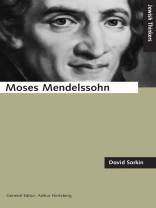Moses Mendelssohn (1729-1786) was the premier Jewish thinker of his day and one of the best-known figures of the German Enlightenment, earning the sobriquet ‘the Socrates of Berlin’. He was thoroughly involved in the central issue of Enlightenment religious thinking: the inevitable conflict between reason and revelation in an age contending with individual rights and religious toleration. He did not aspire to a comprehensive philosophy of Judaism, since he thought human reason was limited, but he did see Judaism as compatible with toleration and rights. David Sorkin offers a close study of Mendelssohn’s complete writings, treating the German, and the often-neglected Hebrew writings, as a single corpus and arguing that Mendelssohn’s two spheres of endeavour were entirely consistent.
A propos de l’auteur
David Sorkin is Lucy G. Moses Professor in the Department of History, Yale University. His other books include ‘Haskalah’ (Jewish Enlightenment) (2000), and The Religious Enlightenment: Protestants, Jews and Catholics from London to Vienna (2008).












